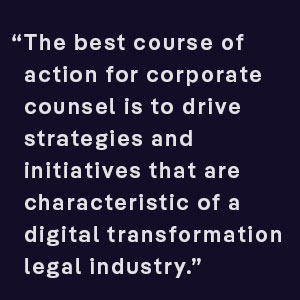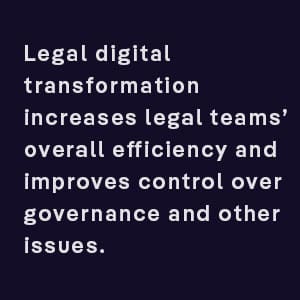It is said that the greatest innovation of the past two centuries is the scientific method. Ever since its creation, the methodical process of constant ‘change’ and improvement has produced a million new innovations and generated incredible, ongoing benefits. And nothing has ever been static or fixed, especially in the evolving digital realm. In fact, it could be said that every piece of technology today is in a state of flux.
In an era of unprecedented technological change, the legal industry, in particular, is approaching an inflection point. In his 2017 book, Tomorrow’s Lawyers: An Introduction to Your Future, British author and speaker Richard Susskind acknowledged that there are two possible futures for the legal profession. The first, which is reassuringly familiar, will see legal professionals working in the same fashion as they have done since the mid-19th century, only they will automate and streamline their old ways of working. The second future is a rather different proposition, involving the adoption of increasingly capable systems and the total transformation of legal professionals and departments.
Quite clearly, general counsels (GCs) and legal leaders are at a “crossroads,” Susskind writes. But whatever they decide to do, tomorrow’s legal world will bear “little resemblance to that of the past.”
In a previous blog post, we discussed the need for general counsels (GCs) and other legal leaders to ponder the opportunities from — and for — technological change. In this blog post, we will explore how they can become true business leaders with the latest legal technology. And how they can help legal departments evolve from a complete cost center to a total value creator.
Legal’s Turning Point — from Cost Centers to Value Creators
In its June 2020 report, “Behaviors of Effective General Counsel,” Gartner states that while general counsels are “more important than ever,” only 19 percent say they “are effective in their role.” Further, it reveals that while 46 percent of GCs want to be a corporate executive, only 8 percent actually serve at this level. And while 7 percent perceive their role as serving as the lead attorney, 59 percent say that this is the actual situation.
Clearly, this indicates the need for corporate legal digital transformation in some shape or fashion. And today’s legal tech solutions can help with that by:
- Ensuring information is accessible by the right members of the legal team
- Providing a secure environment
- Ensuring resources are not misplaced or lost
- Allowing for AI-based translations of many languages
- Facilitating deep searches of all legal content
- Leveraging AI-based analytics for intelligent summarizations and trend analyses
- Providing intelligent workflows
- Enhancing the overall speed of legal teams while removing mundane work from attorneys
Nevertheless, legal digital transformation is not just for organizations that merely want to ‘change with the times,’ and alter their processes or fix departmental problems. It is for those that are considerate of clients’ and partners’ needs, too.
“Digitally enabled business brings incredible disruption to incumbents because they are doing things (that are) orders of magnitude better, orders of magnitude less (expensive), and orders of magnitude faster,” Columbia Business School Professor Rita McGrath told Harvard Business Review’s Ideacast in April 2020.
And so as digital solutions become a part of more business models, they will have more of the C-suite’s attention. “After the coronavirus,… digital is certainly not going to be in retreat,” McGrath said. “We are not going to go back to doing things the old analog way.”
Further to McGrath’s point, legal digital transformation not only increases legal teams’ overall efficiency and effectiveness, and improves control over governance and other issues, but also represents a significant step forward for legal practitioners as leaders.
Simply stated, driving a digital transformation project during a period of transition sends out an unmistakable message. It tells organizations that the office of the general counsel is, in many ways, very much proactive. It tells executives that legal has its eyes on the proverbial ball. Besides, GCs need to better align their departments with the business these days. In fact, they must run legal like any other business function. This reveals legal teams to be a true value center instead of a complete cost center.
Case for a Corporate Legal Digital Transformation
So, being proactive about — and taking initiative around — legal tech cannot be overemphasized. It will ensure legal teams not only sustain themselves, but also grow stronger, thereby improving their own productivity, reducing costs, and showing a greater impact as a business unit.
Also, GCs can consider it a personal win if they do the following:
- Drive more conversations and engagement with C-levels
- Guide senior leadership to regularly review workload analyses and automate lower-value tasks
- Limit the use of outside counsel
- Continue to build a robust legal tech strategy to help with business initiatives
- Establish a case for further legal tech investment
- Encourage continued legal innovation and spur continual improvement
Of course, given this time of significant change, proposing an additional spend may seem difficult, but it is a chance to cite the challenges that the legal team is experiencing currently. Now, tie that in with a solid assessment of where the company is at with its current digital capabilities and legal processes. And project the legal team KPIs and outcomes that can best help the company succeed. Once that is completed, create a blueprint of how to get from the current state to a digitally transformed one, with concrete business outcomes.
Opportunities for Technological Change and Corporate Digital Transformation
Indeed, this millennium has been wrought with major technological changes. The best course of action for corporate counsel, then, is to drive strategies and initiatives that are characteristic of a digital transformation legal industry. It is crucial to deploy the kinds of digital tools that help legal departments do more with fewer resources and better manage risk. Those that provide GCs and other legal leaders the freedom and confidence to focus on higher-level problem-solving and deliver on measurable objectives. Those that help them change the perception of legal from a complete cost center to a total value creator.
In light of all of this, work with a trusted technology partner that understands your legal and business needs. They have to be around every step of the digital transformation journey also. And they should have that ‘human touch’ that makes digital transformation projects a big success. In other words, they must offer a truly unified legal platform and facilitate the adoption and implementation of the system — through technology partnerships and outstanding customer service teams.
To get started, read our e-book, “Three Stages of Legal Digital Transformation.” It includes many helpful tips for your corporate legal team’s digital transformation, including how to go about choosing the right legal tech vendor.
Author:

Sarvarth Misra
Connect with us on Linkedin










